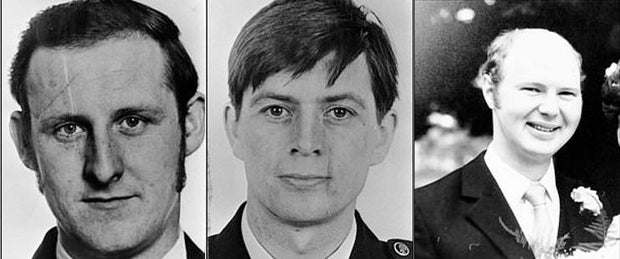CBS News
Arrest made 42 years after IRA car bombing killed 3 police officers in Northern Ireland

A 61-year-old man appeared in a Dublin court Thursday after being arrested in connection with an Irish Republican Army car bombing that killed three Northern Ireland policemen in 1982.
Martin John McCauley was arrested Wednesday on an extradition warrant and will be prosecuted on murder charges in the deaths of Royal Ulster Constabulary Sgt. Sean Quinn and constables Allan McCloy and Paul Hamilton, said Iain Livingstone, head of Operation Kenova that investigated scores of murders, including dozens allegedly carried out by the IRA against informants.
“The decision to prosecute more than 40 years after the incident shows the rigor and application Kenova has applied to this investigation and that evidence will now be tested by a court,” Livingstone said. “Our thoughts remain with the three officers’ families who have continued to act with courage and great dignity over the past four decades.”
Charging McCauley with murder would mark a rare prosecution at this time over the violence known as “the Troubles” that reigned for three decades in a conflict involving Irish republican and British loyalist militants and U.K. security forces that left 3,600 people dead, some 50,000 wounded and thousands bereaved. The 1998 Good Friday peace accord largely ended the violence, though wounds are still raw for the victims.
Operation Kenova
A controversial law passed by the British government last year, the Legacy and Reconciliation Bill, would have given immunity from prosecution for most offenses by militant groups and British soldiers after May 1. But a Belfast judge ruled in February that the bill does not comply with human rights law. The government is appealing the ruling.
The Public Prosecution Service said the decision to press charges in the three murders was made in April before the law went into effect.
“Following careful consideration of all the available evidence in a file submitted by Operation Kenova, the PPS took a decision to prosecute one individual in relation to the 1982 murders of Sergeant Sean Quinn and Constables Allan McCloy and Paul Hamilton,” a spokesperson said in a statement.
The three officers were killed Oct. 27, 1982, when a bomb was remotely detonated along a road in Kinnego Embankment in County Armagh, Det. Sgt. Adrian Murray said in Dublin’s High Court.
According to the BBC, two people suspected of involvement at the time were shot dead two weeks later by the Royal Ulster Constabulary (RUC) officers.
Decades later, new scientific tests were done on material recovered from the time “which has given a much better understanding of the people responsible,” lead investigator John Boutcher said in 2020.
McCauley’s role in the bombing hasn’t been determined but there is forensic evidence tying him to the carefully planned attack, carried out by two members of the IRA, Murray said.
McCauley denies the accusations and will contest his extradition, a law firm representing him said in a statement.
A judge ordered McCauley held until a hearing in the Criminal Courts of Justice.
CBS News
Congress veers toward government shutdown after GOP revolt led by Trump, Musk

Washington — Congress’ path forward on government funding is in limbo after House Republicans, with the support of Elon Musk and President-elect Donald Trump, torpedoed an initial deal to avert a shutdown before a Friday night deadline.
The House descended into chaos Wednesday when the GOP revolt sank a last-minute funding measure to keep the government operating through early next year.
The massive end-of-year spending legislation immediately sparked anger from conservatives when it was unveiled late Tuesday. Texas GOP Rep. Chip Roy referred to it on X as a “1,547-page Christmas tree,” while Rep. Kat Cammack, a Florida Republican, called it “a band-aid that is laced with fentanyl.”
The more than 1,500-page bill released Tuesday was far from a modest stopgap measure. In addition to extending government funding through March 14, it included disaster aid, health care policy extenders and a pay raise for members of Congress, among other provisions. The disaster relief portion of the bill came with a $110 billion price tag.
Elon Musk, the co-head of Trump’s advisory Department of Government Efficiency chimed in with a barrage of posts Wednesday calling the bill “criminal” and suggestions that Republicans who supported it did not belong in Congress. And the opposition culminated in statements from Trump lambasting the new spending and threatening a primary challenge against any Republican supporting the measure.
The president-elect called on Republicans to strip out the additional spending and added a new element instead — raising the debt ceiling. The debt ceiling, which limits how much the government can borrow to pay its bills, is suspended until the first quarter of next year, but Trump said he’d prefer to force President Biden to approve raising the debt ceiling so he wouldn’t have to sign it.
“I will fight ’till the end,” Trump wrote.
Top House Republicans met Wednesday night after the initial deal fell apart, but a new path forward remained unclear Thursday morning as Congress lurched toward Friday night’s deadline to fund the government.
Though stripping out most of the additional funding would satisfy many Republicans, Johnson is likely to need dozens of votes from Democrats, and some are already slamming Johnson for walking away from the agreement. They argue Republicans will shoulder any blame for a potential shutdown.
“Republicans have now unilaterally decided to break a bipartisan agreement that they made,” House Minority Leader Hakeem Jeffries, a New York Democrat, said Wednesday. “House Republicans will now own any harm that is visited upon the American people that results from a government shutdown or worse.”
Tom Williams/CQ-Roll Call, Inc via Getty Images
Spending fight throws Johnson’s speakership into question
The initial plan to keep the government funded and the chaos that surrounded it also prompted intense criticism of Johnson, including from members of his own party.
In addition to the slew of add-ons to the spending bill, conservatives are angry with Johnson for carrying out the negotiating process largely occurred outside of the view of rank-and-file members. Rep. Eric Burlison, a Missouri Republican, called the process “a total dumpster fire.”
A handful of Republicans indicated their support for Johnson’s speakership in the new Congress is now in question, and with such a narrow majority, it would take only a few to take him down. Rep. Thomas Massie, a Kentucky Republican, said flatly Wednesday that he won’t support Johnson in the speaker’s election.
“I’m not voting for him,” Massie said. “This solidifies it.”
In November, House Republicans backed Johnson to lead for another two years during their leadership elections. But the full chamber will vote to elect a speaker on Jan. 3. During the last speaker fight at the beginning of a new Congress in 2023, the slim Republican majority took 15 rounds to elect former Speaker Kevin McCarthy, who was ousted from the role nine months later, partly due to his handling of government funding.
Still, Johnson generally enjoys more favor than McCarthy with the president-elect, who wields widespread influence over House Republicans. Trump told Fox News Digital on Thursday that Johnson would “easily remain speaker” if he “acts decisively and tough” and eliminates “all of the traps being set by Democrats” in the spending package.
CBS News
Alicia Keys reflects on Broadway success and gives back to students at alma mater

Watch CBS News
Be the first to know
Get browser notifications for breaking news, live events, and exclusive reporting.
CBS News
Harlem’s Apollo Theater honored by Kennedy Center for cultural contributions

Watch CBS News
Be the first to know
Get browser notifications for breaking news, live events, and exclusive reporting.






